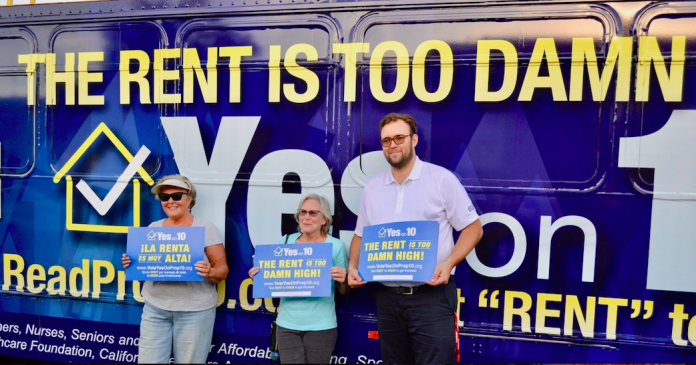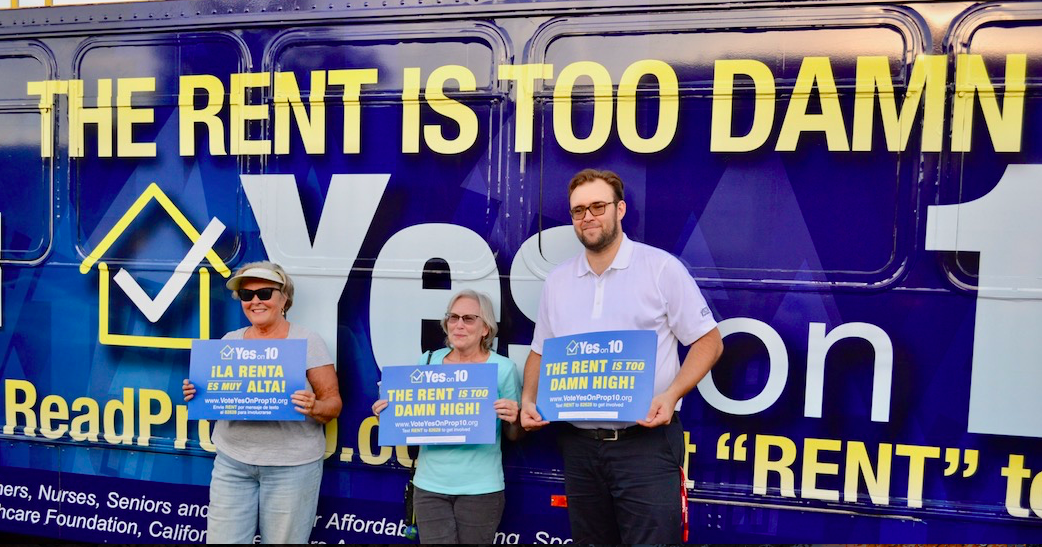
Vote YES to repeal the Costa-Hawkins Rental Housing Act (state ballot measure Proposition 10). This state law repeal will impact the entire state.
Current existing rent control laws will still apply, but they may be changed by local city governments rather than the state legislature.

Costa-Hawkins is a 1995 state bill enacted by the legislature that set restrictions on rent control for cities and counties throughout California. As such, the bill treats each city as if they were identical and not unique.
The Costa-Hawkins bill does not actually set statewide limits on annual rent hikes, and provides eviction protections to tenants. The rates of rent increases are set separately by the 15 California cities that have local rent control laws. The bill has received only minor updates since it went into effect 23 years ago.
While some jurisdictions allow rent increases of 3 percent to 8 percent annually, San Francisco’s rent ordinance allowed a 2.2 percent rent increase between March 1, 2017 and February 28, 2018 and sets rent increases between March 1, 2018 and February 28, 2019 at 1.6 percent. San Francisco’s rent control is based on 60 percent of the increase in the Consumer Price Index posted by the Bureau of Labor Statistics. The CPI for All Urban Consumers in the Bay Area was 2.7 percent posted in November 2017.
Opponents of Prop. 10 — primarily developers, large real estate companies and the politicians that they control — are scared to death that Costa-Hawkins will be repealed by a “Yes” vote. They believe that they will no longer be able to harvest large development fees from building market-rate housing with high rents and will be forced to produce less profitable affordable housing.
San Francisco does not have a market-rate housing shortage, we have an affordable housing shortage. Between 2007 and 2014, developers produced only 18 percent of San Francisco’s medium-income affordable housing stock quota, 45 percemt of the low-income quota, and 109 percent of the city’s market-rate quota set by the Regional Housing Need Allocation (RHNA) goals. The production goal deficit in San Francisco included 5,547 medium-income units not built, and 6,696 low-income units not built.
Developers are currently trying to scare the hell out of voters by airing a 30-second television commercial. The advertisement text states the following:
“Deeply flawed, badly written. That’s Proposition 10. It does the opposite of what it promises. Prop 10 will drive up rents, take rental housing off the market, and make it harder to find a place to live. And Prop 10 has no protection for renters, seniors, veterans, or the disabled, and no provisions to treat homelessness or build affordable housing. That’s why veterans, seniors, and affordable housing experts say No on 10. It makes a bad problem worse.”
This is called the “Chicken Little—The Sky Is Falling” argument. By naming all of the things that might possibly go wrong without any reliable data or reports to substantiate their suppositions or arguments, opponents of the repeal of Costa- Hawkins are simply stating their worst fears—not facts.
None of this ad copy is true. Proposition 10 promises nothing more than the repeal of Costa-Hawkins. You might as well say, that “it might rain tomorrow” and you would be as accurate as this tripe. The repeal of-Costa Hawkins will simply allow San Francisco politicians, tenants, and landlords to maintain a dynamic tension locally without state interference.
The advertisement was paid in part by:
- “Essex Property Trust, a publicly-traded real estate investment trust that invests in apartments, primarily on the West Coast of the United States. As of December 31, 2017, the company owned interests in 247 apartment complexes, aggregating 60,239 apartment units, and 1 office building comprising 106,564 square feet.”
- “Equity Residential, a publicly-traded real estate investment trust that invests in apartments. As of December 31, 2017, the company owned or had investments in 305 properties consisting of 78,611 apartment units in Boston, New York City, Washington DC, Seattle, San Francisco, and Southern California.”
- “AvalonBay Communities, Inc., a publicly-traded real estate investment trust that invests in apartments. As of January 31, 2018, the company owned 77,614 apartment units, all of which were in New England, the New York City metropolitan area, the Washington, D.C. metropolitan area, Seattle, and California.”
Pigs at the trough. These national real estate companies care only about their own bottom line profits. If they really cared about renters, seniors, veterans, disabled or the homeless,they should donate their ad budget to these causes.
The real value of Costa-Hawkins repeal is that it will restore authority to California’s cities and counties to develop and implement local policies that ensure renters are able to find and afford decent housing in their jurisdictions while still protecting landlord’s ability to charge fair rents and earn a reasonable rate of return.
Prop. 10 doesn’t automatically enact or strengthen rent control. It simply says it’s time to look at the 23-year-old state law and return responsibility for new ordinances back to local control.
According to Susan Kirsh, the Chair of Livable California, “It’s become popular to refer to an affordable housing crisis. Yet the ‘build, build, build’ remedy rarely provides housing for low-income workers. Buying a new car isn’t as ‘affordable’ as buying a used one. Building new housing — even tiny units — isn’t affordable to anybody on minimum wage. According to the State Legislative Analyst’s office, trickle-down affordability will take 25 to 30 years.”
Kirsh further says, “The crisis we face is the systematic effort to dismantle local control and replace it with unelected, regional bureaucracies. The crisis is the rush to pass more draconian legislation, like the dozen or so housing bills passed in 2018, piled on top of the 14 housing bills passed in 2017, which Berkeley researchers warn have unpredictable outcomes. The crisis is believing the mantra ‘we have to do something’ justifies legislation that benefits a few, while jeopardizing the majority.”
The crisis is legislation that increases the financial burden on cities without calling it what it is — an unfunded mandate.
Does anyone remember State Senator Scott Wiener’s ridiculous and failed SB-827? Well … he will be reintroducing a version of this bill next January.
San Francisco’s rent control protects all tenants who live in buildings that were built on or before 1979.
The current Costa-Hawkins Act protects a landlord’s right to raise the rent to market rate on a unit once a tenant moves out. It prevents cities from establishing rent control — or capping rent — on units constructed after February 1995. It exempts single-family homes and condominiums from rent control restrictions.
Under the current Costa-Hawkins Act a landlord may charge thousands more for a unit to 1) Recoup the low rental price that was being paid by a previous tenant, and 2) Make money on a unit that may be off of the market for years. These resulting high rental prices can lead to high rent, housing shortages, excess density, and homelessness.
Please vote yes on Costa Hawkins repeal.
George Wooding is the president of the Coalition For San Francisco Neighborhoods. Feedback: wooding@westsideobserver.com

